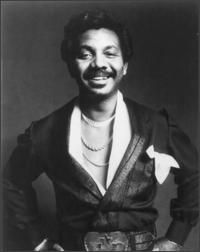|
|||
TYRONE DAVIS (1938 - 2005)
Whether they know it or not, many of today's soul crooners take their cues from Tyrone Davis, who forged one of the more distinctive personas in rhythm and blues during the last five decades. He was a suave smoothie who sang about relationships with a mixture of wisdom and regret. He not only helped define the sound of Chicago soul in the 1960s and '70s in the wake of Curtis Mayfield, Jerry Butler and Gene Chandler, he continued to record and tour until he suffered a stroke last September.
Like many Southerners who came to post-war Chicago in the 1950s seeking a steady paycheck, the teenage Tyrone Davis did whatever it took to make his mark. He worked at a South Side factory by day to support his young family, but by night he was trolling West Side blues clubs. There he insinuated himself into Freddy King's entourage and soon found himself the valet for the legendary guitarist on his cross-country tours. A few years later, Davis attended a Bobby "Blue" Bland concert dressed to the nines and planted himself next to the stage. The blues star offered him a microphone. "Wanna sing, son?" Bland asked. Davis did, and then got some life-changing advice from the hit-making singer. "Be you, don't be me," Bland told his new charge. "The best thing that ever happened to me," Davis later said. "It is really hard to find yourself. Most people that come out today sound like somebody else."
Davis' hits, including "Turn Back the Hands of Time", "Can I Change My Mind" and "Turning Point", reflected a dark, nearly whispered perspective on relationships that endeared him to the black working-class community for decades. By 1971, he was a star, riding a couple of top 10 hits. "He was like Mr. Chicago," singer Willie Clayton once said. "It was a thrill to be around and see the fancy cars; you name it, he had it." Val Kashimura, an R&B singer and executive at Davis' Mississippi-based label, Malaco Records, called Davis "One of the big dogs in our line of work. They used to call Frank Sinatra, Dean Martin and Sammy Davis Jr. the Rat Pack. Well, I used to call Tyrone Davis, Bobby Bland, Johnny Taylor and Little Milton the Four Pack, because they were the godfathers of R&B and blues for a couple generations of artists. We used to call him Daddy because he was the wise one, someone who all the other Malaco artists looked up to."
Tyrone Davis was born in Greenville, Mississippi. By age 19, he was in Chicago where he forged relationships with such contemporaries as Otis Clay, Mighty Joe Young and Otis Rush. After taking Bland's career advice to heart, he began perfecting a unique style that bridged bluesy grit and soul smoothness and became known as Tyrone the Wonder Boy. His relaxed, intimate approach and confessional lyrics finally clicked on the 1968 single "Can I Change My Mind", a #5 pop hit, recorded for Carl Davis' Dakar label. Otis Clay said that the song was offered to him, but "in the midst of our talking in the way we normally do, I forgot it. Well, the rest of it is history. It was a million-seller. I forgot a million-seller. Tyrone never let me forget that."
Davis, in the role of the penitent gentleman in a brightly colored tuxedo,
established a sound that distinguished him from more strident soul contemporaries
such as Clay and Taylor. As popular taste changed, he adapted by recording
songs such as "Get On Up (Disco)", but he never veered from
his becalmed yet sensual perspective. By the time he started recording
for Malaco in the 1990s, he had become a respected elder statesman on
the blues and R&B circuit. His records continued to sell to black
audiences, and he was regularly booked for weekend concerts until the
stroke silenced him. He died on February 9th, aged 66.
Greg Kot - The Chicago Tribune
Tyrone Davis, singer: born May 4th, 1938 - died February 9th, 2005.
